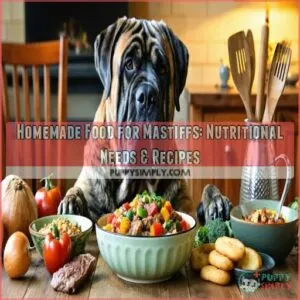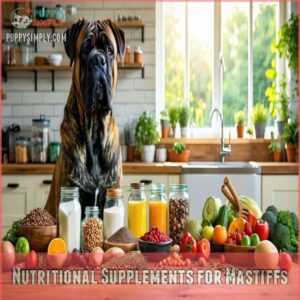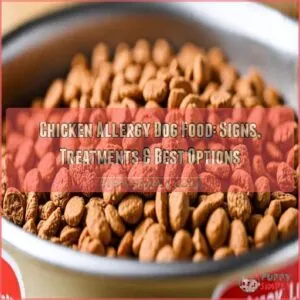This site is supported by our readers. We may earn a commission, at no cost to you, if you purchase through links.
 Imagine the joy in your Mastiff’s eyes as they devour a delicious homemade meal tailored to their nutritional needs. No more worrying about questionable ingredients or fillers – you have full control over what goes into their bowl.
Imagine the joy in your Mastiff’s eyes as they devour a delicious homemade meal tailored to their nutritional needs. No more worrying about questionable ingredients or fillers – you have full control over what goes into their bowl.
In this article, we will explore the benefits of homemade food for Mastiffs and provide you with nutritious recipes that are easy to prepare. Give your loyal companion the wholesome goodness they deserve with our guide to mastiff homemade food.
Table Of Contents
- Key Takeaways
- Is Homemade Food Suitable for Mastiffs?
- Transitioning to a Homemade Diet for Mastiffs
- Preparing Homemade Food for Mastiffs
- Sample Homemade Food Recipes for Mastiffs
- Nutritional Supplements for Mastiffs
- Potential Risks and Challenges of Homemade Food for Mastiffs
- Frequently Asked Questions (FAQs)
- How much homemade food should I feed my Mastiff?
- Are there any specific ingredients that I should avoid when making homemade food for my Mastiff?
- Can I use raw meat in homemade food for my Mastiff?
- Should I consult with a veterinarian before transitioning my Mastiff to a homemade diet?
- Are there any specific supplements that I should include in homemade food for my Mastiff to ensure they are getting all the necessary nutrients?
- Conclusion
Key Takeaways
- Control over ingredients and customization for specific dietary needs/preferences
- Follow precise recipes from reputable sources to ensure proper nutritional balance
- Use high-quality ingredients and gradually introduce the new food alongside the current diet
- Consult with a veterinarian before making any changes to your dog’s diet
Is Homemade Food Suitable for Mastiffs?
If you own a Mastiff, homemade food can be a suitable option for their nutritional needs. Providing your Mastiff with balanced homemade dog food offers several benefits. Firstly, it gives you control over the ingredients used, ensuring that only high-quality and fresh ingredients are included in their diet. Homemade meals also allow for customization based on specific dietary requirements or preferences of your Mastiff. Transitioning to a homemade diet should be done gradually to avoid any digestive issues. It’s always recommended to consult with a veterinary nutritionist who can provide personalized guidance and recipes tailored specifically for your Mastiff’s needs. While there are numerous benefits associated with feeding homemade food to your Mastiffs, there are also risks involved if not done properly. Inaccurate recipes or substitutions may result in unbalanced diets lacking essential nutrients required by the breed. To ensure proper nutrition balance and prevent deficiencies, it’s crucial to follow precise recipes provided by reputable sources such as veterinary nutritionists. By taking the appropriate measures and following professional advice from experts in canine nutrition like veterinary professionals or certified pet nutritionists when preparing balanced homemade dog food recipes tailored specifically for mastiffs’ unique nutritional requirements, you can provide them with wholesome meals while maintaining optimal health throughout their lives without compromising quality or safety standards. ## Understanding the Nutritional Needs of Mastiffs
To ensure the health and well-being of your Mastiff, it’s important to understand their specific nutritional needs. Protein requirements for Mastiffs are higher compared to smaller breeds due to their size and muscle mass. Adequate fat intake is also crucial for energy and maintaining a healthy coat. Carbohydrates provide energy, while vitamins and minerals play essential roles in various bodily functions. By understanding these nutritional needs, you can tailor homemade food recipes that meet the unique dietary requirements of your Mastiff.
Protein Requirements
To meet the nutritional needs of your Mastiff, it’s important to understand their protein requirements and how homemade food can provide a suitable source. Protein sources such as chicken, turkey, beef, lamb, pork (in limited amounts), and various fish can help balance their diet. Homemade dog food allows you to control the quality of protein and ensure they get essential fatty acids for optimal health.
Fat Requirements
To ensure a balanced and nutritious homemade diet for your Mastiff, it’s important to understand their specific fat requirements. Fat is an essential nutrient that provides energy, supports skin and coat health, and aids in the absorption of certain vitamins. Incorporate healthy sources of fat such as animal fats, plant-based oils like olive or coconut oil, and fish oil into your Mastiff’s homemade meals for optimal nutrition.
Carbohydrate Requirements
To meet the nutritional needs of Mastiffs, it’s important to understand their carbohydrate requirements. Carbohydrates provide essential energy for these large dogs and should come from nutrient-rich sources like whole grains and vegetables. Customized recipes can be tailored to include appropriate protein sources, fat balance, and mastiff-specific variations to ensure proper nutrition for your beloved pet.
Vitamin and Mineral Requirements
What essential vitamins and minerals do Mastiffs require in their homemade diet?
- Vitamin A: Supports vision, immune function, and skin health.
- Calcium: Essential for strong bones and teeth.
- Iron: Necessary for oxygen transport in the body.
Providing a well-rounded homemade diet ensures that your Mastiff receives these vital nutrients to promote optimal health and vitality.
Transitioning to a Homemade Diet for Mastiffs
When transitioning your Mastiff to a homemade diet, you can gradually introduce the new food alongside their current diet. This helps their digestive system adjust and minimizes any potential gastrointestinal upset. Before making the transition, it’s important to consult with a veterinarian or veterinary nutritionist who can guide you through the process based on your Mastiff’s specific nutritional requirements. To ensure a smooth transitioning process, it’s crucial to follow the recipe for homemade dog food precisely. Homemade dog food preparation techniques should be followed diligently to avoid any nutritional deficiencies or imbalances in your Mastiff’s diet. During this period of transition, closely monitor your Mastiff’s digestion and overall health. Keep an eye out for any adverse reactions such as vomiting or diarrhea and promptly report them to your veterinarian if necessary. By following these steps and incorporating sample recipes tailored specifically for mastiffs into their daily meals, you can successfully make the transition from commercial dog food to nutritious homemade meals that meet all of their nutritional needs without sacrificing flavor or variety.
Preparing Homemade Food for Mastiffs
Now that you understand the nutritional needs of Mastiffs and have a recipe in mind, it’s time to prepare homemade food for your furry friend. Start by selecting high-quality ingredients such as lean protein sources like chicken or beef, fresh vegetables, and whole grains. Use cooking and mixing techniques that ensure the food is thoroughly cooked while preserving its nutritional value. Finally, store the prepared food properly in portioned containers in either the refrigerator or freezer to maintain freshness and prevent spoilage.
Selecting High-Quality Ingredients
When preparing homemade food for your Mastiff, it’s important to select high-quality ingredients that will meet their nutritional needs. Choose ingredients such as:
- Lean ground turkey
- Brown rice
- Peas
- Olive oil
To provide a balanced meal. Look for fresh produce and organic options whenever possible. Incorporate cooking techniques that retain the nutrients in the ingredients while ensuring they’re safe for consumption. Properly store any leftovers or prepared meals to maintain freshness and prevent spoilage.
Cooking and Mixing Techniques
To prepare homemade food for your Mastiff, you’ll need to employ specific cooking and mixing techniques.
- Cooking Methods:
- Boiling or steaming meat and vegetables to retain nutrients.
- Baking or roasting meat for added flavor and texture.
-
Avoid frying or using excessive oil.
- Mixing Tips:
- Thoroughly combine ingredients to ensure even distribution of nutrients.
-
Consider using a blender or food processor for a smoother consistency.
- Portion Control & Nutritional Balance:
- Follow dog food ratios recommended by veterinarians for proper nutrition.
- Monitor your Mastiff’s weight and adjust portions accordingly.
By following these tips, you can create nutritious homemade recipes that cater specifically to your Mastiff’s needs without compromising on taste!
Proper Storage and Portioning
To properly store and portion homemade food for your Mastiff, ensure freshness and convenience by following these guidelines:
- Use airtight containers or freezer-safe bags to store the food in the refrigerator for 3-4 days or freeze it for up to two months.
- Portion out individual servings based on your Mastiff’s size, weight management needs, and sensitivity issues.
- Thaw frozen portions in the fridge overnight before serving to maintain optimal nutrition and safety.
Sample Homemade Food Recipes for Mastiffs
Looking to make homemade food for your Mastiff? Here are some sample recipes that cater to their nutritional needs: For a protein-rich option, consider using high-quality meat sources like beef or chicken combined with vegetables and grains. If you prefer a balanced meal, try mixing lean meats such as turkey or fish with nutrient-rich veggies and adding in some healthy fats. And for those looking for grain-free options, there are recipes available that use alternative carbohydrate sources like sweet potatoes or quinoa.
Protein-Rich Recipe
To provide a well-rounded homemade diet for your Mastiff, consider incorporating a protein-rich recipe that meets their nutritional needs. A protein-rich recipe offers numerous health benefits, including:
- Muscle development and repair
- Improved immune function
- Healthy skin and coat
When selecting protein sources for your Mastiff’s homemade food, opt for high-quality options such as:
- Lean meats (chicken or beef)
- Fish (salmon or sardines)
- Eggs
- Dairy products like yogurt
Remember to consult a veterinarian before transitioning to homemade dog food recipes to ensure proper balance of nutrients.
Balanced Meal Recipe
Now let’s explore a balanced meal recipe that’s suitable for Mastiffs, ensuring they receive all the essential nutrients they need to thrive. A balanced dog food diet for Mastiffs should include:
- High-quality protein sources like chicken or beef
- Healthy fats and fatty acids from fish oil or animal fats
- Fiber sources such as pumpkin or brown rice
- Necessary vitamins and minerals
Follow clear instructions for homemade dog food preparation to provide your Mastiff with a nutritious meal schedule.
Grain-Free Option
For a grain-free option that caters to the nutritional needs of your Mastiff, consider this homemade recipe. Grain-free diets can offer benefits such as reduced risk of dietary allergies and balanced nutrition. Choose high-quality protein choices like turkey or fish, paired with vegetables like sweet potatoes and green beans for added nutrients. Homemade treats provide an opportunity to customize ingredients while ensuring a well-rounded diet for your furry friend without breaking the bank. ## Important Considerations for Mastiff Homemade Food
When preparing homemade food for your Mastiff, it’s important to consult with a veterinarian who can provide personalized guidance based on your dog’s specific needs. They can help ensure that the diet meets all of their nutritional requirements and address any potential allergies or sensitivities they may have. Additionally, be mindful of adjusting portion sizes as needed to maintain a healthy weight for your Mastiff and monitor their overall health and well-being.
Consulting With a Veterinarian
Before diving into preparing homemade food for your Mastiff, it’s essential to consult with a veterinarian who can provide important considerations specific to your dog’s needs. Nutritional consultation from a vet will ensure that you’re meeting the dietary requirements of your Mastiff and addressing any health concerns. They can guide you on the appropriate balance of protein, fats, carbohydrates, and vitamins in their diet. Consulting with a veterinarian is crucial for creating a tailored and healthy homemade diet for your beloved Mastiff.
Monitoring for Allergies or Sensitivities
During the transition period and as you continue to feed your Mastiff homemade food, it’s important to monitor for any allergies or sensitivities that may arise. Keep an eye out for symptoms such as itching, diarrhea, vomiting, or changes in behavior. If you suspect an allergy or sensitivity, consult with a veterinarian to rule out any underlying health issues. Remember that every dog is unique and what works for one may not work for another. Use personal judgment when buying ingredients and consider making adjustments based on your Mastiff’s needs.
Adjusting Portion Sizes
When adjusting portion sizes for your Mastiff’s homemade food, consider their individual needs and activity level. To ensure proper nutrition and weight management, take into account factors such as:
- Age
- Growth rate
- Breed size
- Calorie needs based on their activity level
It’s important to tailor the portions accordingly to meet their specific requirements. Additionally, considering the digestibility of the food type can help prevent any digestive issues or discomfort for your Mastiff.
Nutritional Supplements for Mastiffs
To ensure optimal joint health for your Mastiff, it’s important to consider incorporating certain nutritional supplements into their homemade food. Supplements such as glucosamine and chondroitin are known to support cartilage health and reduce joint inflammation. Omega-3 fatty acids can also be beneficial in promoting overall joint function and reducing stiffness.
Essential Supplements for Joint Health
To support the joint health of your Mastiff, it’s important to incorporate essential supplements into their homemade food. Adding glucosamine and chondroitin can help promote healthy cartilage and reduce inflammation in their joints. Turmeric, with its anti-inflammatory properties, can also be beneficial. Omega 3 fatty acids from sources like fish oil provide additional joint support. Green-lipped mussel extract is another supplement that has shown promise in improving joint mobility and reducing pain in dogs with arthritis or other joint issues.
Omega-3 Fatty Acid Supplements
You should consider incorporating omega-3 fatty acid supplements into your mastiff’s homemade diet for optimal nutrition. Omega-3 fatty acids offer numerous benefits, including:
- Improved heart health
- Reduced inflammation
- Enhanced brain function
Good sources of omega-3s include fish oils like salmon oil or krill oil. The recommended dosage for a mastiff is typically 1000mg to 1500mg per day. While omega-3 fatty acids are generally safe, some potential side effects may include digestive upset or blood thinning in high doses.
Calcium and Vitamin D Supplements
To ensure proper bone health and development, it’s important to include calcium and vitamin D supplements in your Mastiff’s homemade diet.
- Calcium absorption: Calcium is essential for strong bones and teeth.
- Calcium deficiency: Inadequate calcium intake can lead to weak bones and skeletal issues.
- Vitamin D deficiency: Vitamin D helps the body absorb calcium.
Consult with a veterinarian to determine the recommended dosage of these supplements, as both calcium deficiency and vitamin D toxicity can have adverse effects on your Mastiff’s health.
Potential Risks and Challenges of Homemade Food for Mastiffs
When considering homemade food for your Mastiff, it’s important to be aware of the potential risks and challenges involved. One concern is the risk of nutritional imbalances if the diet lacks essential nutrients or isn’t properly balanced. Additionally, meeting specific dietary needs can be challenging, especially for dogs with certain health conditions or allergies. Lastly, preparing homemade food requires time and effort in order to ensure that your Mastiff receives a well-rounded and nutritious diet.
Nutritional Imbalances
Avoiding nutritional imbalances is crucial when preparing homemade food for your Mastiff. For example, a calcium deficiency can result in bone abnormalities, while a vitamin A deficiency may cause night blindness. Taurine deficiency has been linked to heart disease, and phosphorus deficiency can lead to rickets. It’s important to ensure that your homemade diet provides all the necessary nutrients for optimal health and well-being of your Mastiff.
Difficulty Meeting Specific Dietary Needs
Meeting specific dietary needs can be challenging when preparing homemade food for Mastiffs. Allergies, intolerances, nutrient deficiencies, and weight management are just a few factors to consider. Certain ingredients may cause gastrointestinal issues or exacerbate conditions like renal disease in Mastiffs. It’s crucial to work closely with a veterinarian or veterinary nutritionist to create well-balanced recipes that meet your Mastiff’s unique nutritional requirements while addressing any specific health concerns they may have.
Time and Effort Required
When making homemade food for your Mastiff, it’s important to consider the time and effort required, as well as the potential risks and challenges involved. Homemade dog food can be time-consuming and labor-intensive due to the preparation, cooking, and portioning processes. However, it can also be cost-effective compared to store-bought options while providing fresh and nutritious meals tailored specifically for your Mastiff’s needs. It’s crucial to follow vet-approved recipes to ensure a safe diet for your furry friend. ## Complementary Commercial Dog Food Options for Mastiffs
If you’re considering adding complementary commercial dog food to your Mastiff’s diet, there are various options available. Grain-free options and limited ingredient formulas can be beneficial for dogs with allergies or sensitivities. Look for hypoallergenic options that have been approved by veterinarians to ensure they meet your Mastiff’s nutritional needs. Commercial dog food is available in both wet and dry forms, giving you flexibility in choosing what works best for your pet. Wet food can provide hydration while dry food offers convenience and cost-effectiveness. It’s important to note that commercial foods should still be supplemented with homemade meals to ensure a well-rounded diet. When selecting commercial dog foods, read the labels carefully and choose reputable brands that prioritize quality ingredients without unnecessary additives or fillers.
Frequently Asked Questions (FAQs)
How much homemade food should I feed my Mastiff?
To ensure your Mastiff receives a balanced homemade diet, consult with a veterinarian or veterinary nutritionist. They can provide personalized guidance on the appropriate portion sizes and nutrient ratios based on your dog’s specific needs and health conditions.
Are there any specific ingredients that I should avoid when making homemade food for my Mastiff?
When making homemade food for your Mastiff, avoid ingredients like:
- Onions
- Garlic
- Grapes/Raisins
- Chocolate
- Caffeine
These can be toxic to dogs and may cause health issues. Stick to safe and nutritious options for your furry friend’s well-being.
Can I use raw meat in homemade food for my Mastiff?
Yes, you can use raw meat in homemade food for your Mastiff. Raw meats like beef or chicken should be handled safely to minimize the risk of bacterial contamination and ensure a balanced diet with appropriate nutrient ratios.
Should I consult with a veterinarian before transitioning my Mastiff to a homemade diet?
Consulting with a veterinarian before transitioning your Mastiff to a homemade diet is as important as seeking expert advice when embarking on a new fitness routine. Their expertise ensures your dog’s specific nutritional needs are met, promoting optimal health and well-being.
Are there any specific supplements that I should include in homemade food for my Mastiff to ensure they are getting all the necessary nutrients?
To ensure your Mastiff gets all the necessary nutrients, consider adding dog-specific vitamin and mineral supplements to their homemade food. Consult with a veterinarian for personalized guidance on the specific supplements your Mastiff may need.
Conclusion
Treat your Mastiff to the ultimate dining experience with homemade food tailored to their nutritional needs. By preparing their meals yourself, you can ensure they’re getting the best ingredients without any questionable additives. Understanding their specific protein, fat, carbohydrate, vitamin, and mineral requirements is key to creating a balanced diet. With the right ingredients, cooking techniques, and storage methods, you can provide your Mastiff with delicious and nutritious meals that will keep them happy and healthy. Try out our homemade food recipes for Mastiffs and see the difference it makes in their overall well-being.
















